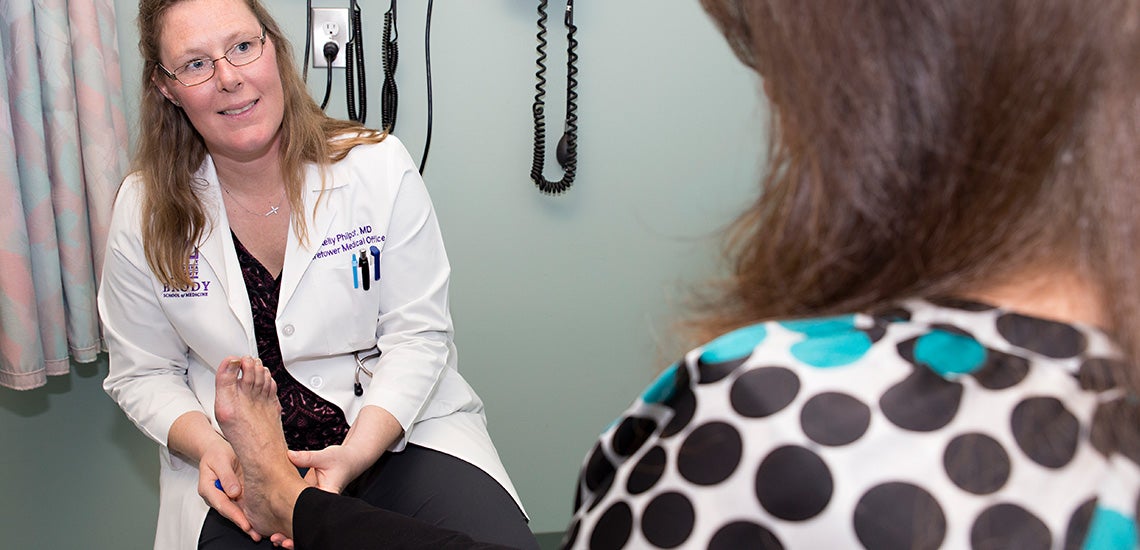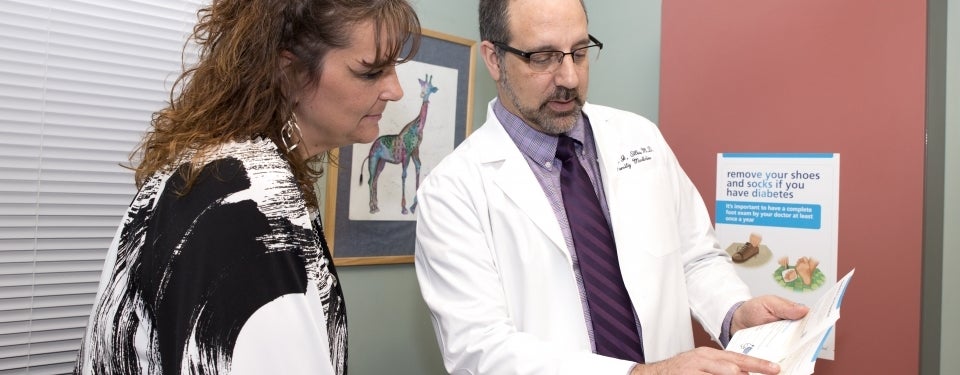PROJECT CORE
Program helping ECU, Vidant doctors save patients time, money
Getting an appointment to see a medical specialist can be a lengthy and costly process for patients.
The high demand for appointments, coupled with the limited number of available specialists, can often result in primary care physicians having to wait months for consults from specialists on how to best treat their patients’ conditions.
For doctors at ECU and Vidant Health, however, a new electronic consult program is enabling primary care physicians and specialists to communicate about patients’ needs electronically before the patients have to worry about scheduling an appointment or paying a copay.
ECU and Vidant are among only 18 academic medical centers nationwide participating in the Association of American Medical Colleges’ Project CORE, which aims to improve the patient referral process between primary and specialty care using electronic eConsult and enhanced referral templates.
“Project CORE benefits our patients and physicians by giving our physicians a tool to rapidly get an expert opinion on their clinical question in a way that provides the specialist with a full picture of the patient’s medical condition through their electronic record,” said Dr. Jason Foltz, interim medical director for ECU Physicians. “Ultimately, this creates a learning environment that allows for continuous communication between our primary care physicians and specialists.”
Quick reassurance
A group of primary care and specialty doctors from ECU and Vidant took the materials and information provided by the AAMC and developed templates of their own. These new templates were based on medical issues the specialists determined they could address without seeing a patient in person, as long as they had specific information about the patient.
“There are a lot of questions that merit input from an endocrinologist that don’t necessarily require a patient to see us. A patient could have a borderline endocrine lab abnormality that may not require anything to be done,” said Dr. Almond Drake III, chief of the Division of Endocrinology at ECU’s Brody School of Medicine. “It’s understandable if the primary care doctor doesn’t feel comfortable ignoring it, but they might just not have the experience to know that it can be just followed. I can give them that reassurance through an eConsult.”
Drake credited part of the program’s effectiveness to primary care doctors knowing when eConsults are appropriate and when it’s best for a patient to be seen in person.
“Probably more than half of them are simple questions that we can answer with eConsult and save the patients the expense and time of coming over here, and allow us to keep that appointment open for somebody else who really has to come,” Drake said. “It allows me to help and provide assistance to more patients than I could if they all had to wait to be seen at the clinic.”
Better, sooner
For primary care physicians like family physician Dr. Tommy Ellis, medical director for ECU Physicians’ Firetower Medical Office, the eConsults and enhanced referrals are an opportunity to help their patients start feeling better, sooner.
“Before we did this, and I needed a question answered, access was the issue. It could take upward of six months to get that patient into the practice just to get the original answer,” Ellis said. “So instead of waiting for these long periods of time until you get answers, you’re kind of working with the specialist to get the answer faster.”
Now, instead of waiting weeks or months, primary care doctors are able to get their patients answers in a matter of hours.
“The AAMC gave us a goal of having these turned around in 72 hours. Currently, our average is 22 hours, so we’re way below that,” said Mary Thompson, director of health information systems for ECU Physicians. “We’re very proud of that.”
Safer ‘curbside consults’
The eConsults also offer a modern, and better documented, take on a long-time practice referred to as a “curbside consult” in which doctors informally ask other doctors for their professional opinions on how to treat a patient.
“That’s basically what this is, it’s turned into a kind of electronic curbside consult,” Ellis said. “But if you compare it to the curbside consult, it’s just safer for the patient. The curbside consult relies on memory. This is actually using the data from the EMR (electronic medical record) and it’s integrated into the consult. So you don’t have to guess, because all of the patient’s information is there.”
There are presently seven specialties – endocrinology, nephrology, gastroenterology, neurosurgery, infectious disease, dermatology and hematology – already part of the Project CORE program at ECU and Vidant, with others slated to join the program as early as June, Thompson said.
The first ECU and Vidant clinics went online with the program in October 2016 and officials are currently reviewing metrics on the program to identify its quantitative benefits, as well as potential areas of improvement and growth.
“The whole premise behind this is you want to see that it’s helping your access rate,” Thompson said. “In other words, is it helping those patients who really need to be seen (by a specialist) get seen faster because you’re keeping all the lower-acuity patients out of that practice? Even a small amount would help us see that yes, this is helping.”

Dr. Kelly Philpot, family physician at ECU Physicians Firetower Medical Clinic, examines the foot of a diabetes patient.
